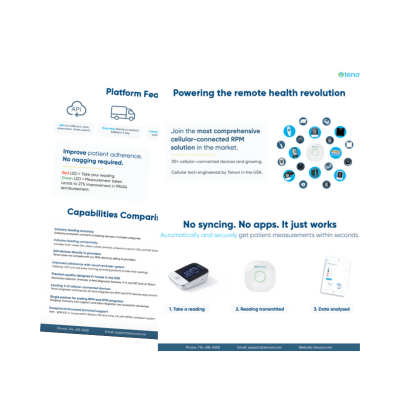Welcome to Tenovi’s weekly research roundup, where we summarize the latest published digital health studies, including telemedicine, remote patient monitoring, and telehealth innovations and their applications. This week, we focus on three new digital health study summaries exploring the potential of emerging technologies to transform chronic disease prevention and management in home settings. Join us as we delve into the forefront of healthcare evolution through these insightful digital health study revelations.
Digital Health Study 1: Optimized Pathways for Chronic Disease Management
Proposing an “Innovative Disease Management” model, this digital health study highlighted the potential of emerging biosensors, wearables, and AI-supported platforms to enable personalized real-time data capture, predictive risk modeling, tailored feedback, and streamlined coordination between multidisciplinary care teams.
Published in Bioelectronic Medicine, findings cited evidence that such optimized frameworks could reduce hospitalizations by up to 58% for conditions like heart failure. Patient-centered models also increased one-year survival by up to 26% for certain groups by promoting preventive behaviors. Economically, productivity gains from remote health tools could add €93 billion to EU GDP. Streamlining care logistics was estimated to save €1 billion in Italy.
However, issues around the biocompatibility of implants, health data interoperability, reimbursement of novel interventions, clinical workflow integration, and patient trust must still be worked out to actualize the paradigm shift toward digitally-driven, preventative, and participatory precision medicine.
Digital Health Study 2: Digital Platforms for Senior Wellbeing
A systematic analysis of 15 digital health studies focused on adoption patterns, measurable health impacts, and qualitative feedback around digital health interventions for older adult populations. Published in Sustainability, findings showed increasingly positive attitudes and uptake of telehealth and mHealth solutions for preventive care, chronic disease management, and age-related conditions. However, age, income, and geographical divides still limit equitable access.
While preliminary efficacy data indicates encouraging trends around behaviors, balance, reduced complications, and costs, better-controlled trials with standardized measures are required to substantiate claims, compare technologies, establish clinical significance, and clarify working mechanisms. Additionally, research exploring integration strategies and ethics around transparency, security, and human relationships can optimize design to meet diverse user expectations.
Digital Health Study 3: Smart Healthcare Systems for At-Home Care
In this new digital health study published in DIGITAL HEALTH, researchers reviewed the evidence on smart healthcare systems comprising remote sensors, wearable trackers, monitors, and other networked devices for enabling continuous physiological monitoring and personalized feedback. While findings remain preliminary, real-world implementations show promise. For example, improved diagnosis, treatment adherence, reduced hospital visits, and better overall health indicators among patients with heart disease, respiratory conditions, and other chronic illnesses.
However, these digital health solutions aren’t universally effective compared to traditional methods. As developers work to increase the accuracy and accessibility of smart healthcare tools, more rigorous studies around efficacy across diverse care scenarios will help strengthen the case for investment by health systems.
The Way Forward
This week’s digital health study summary reinforces the view that emerging mHealth, telemedicine, wearable, and AI solutions can transform chronic disease management into more proactive, personalized, and patient-centric. As enabling technologies continue advancing, thoughtful design and principled application will be key to ensuring clinical effectiveness, access equality, and positive user experiences so that those most in need can benefit from healthcare’s digital transformation. We hope you find this digital health study summary helpful in providing insights to help developers, investigators, and health systems navigate the path toward improved care.
To receive Tenovi’s Weekly Research Round-Up, simply scroll down to subscribe. If you are part of a chronic care management, telehealth, or RPM software and services company, explore Tenovi RPM solutions. Book your free demo and consultation with us today.


